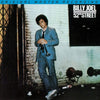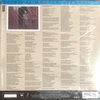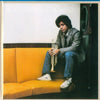





Billy Joel – 52nd Street (2LP, 45RPM, Ultra Analog, Half-speed Mastering)
ORDER LIMITED TO ONE ITEM PER CUSTOMER
Billy Joel – vocals, acoustic piano, Yamaha CP-70 electric grand piano, Fender Rhodes, synthesizers [click here to see more vinyl featuring Billy Joel]
Freddie Hubbard – flugelhorn and trumpet (B1) [click here to see more vinyl featuring Freddie Hubbard]
Peter Cetera – backing vocals (A3)
Donnie Dacus – backing vocals (A3)
Frank Floyd – backing vocals (C2)
Babi Floyd – backing vocals (C2)
Milt Grayson – backing vocals (C2)
Zack Sanders – backing vocals (C2)
Ray Simpson – backing vocals (C2)
Steve Khan – electric guitar, acoustic guitar, backing vocals
Doug Stegmeyer – bass, backing vocals
Richie Cannata – organ, saxophones, clarinet
David Spinozza – acoustic guitar (A2)
David Brown – electric guitar (A3)
Russell Javors – acoustic guitar (A3)
Hugh McCracken – nylon guitar (C1, D1)
Eric Gale – electric guitar (C2)
Liberty DeVitto – drums
Mike Mainieri – vibraphone and marimba (B1, C1)
Ralph MacDonald – percussion (C1-2)
David Freidman – orchestral chimes and percussion (D1)
George Marge – sopranino recorder (C1)
Robert Freedman – horn and string orchestrations (A2, D1)
Dave Grusin – horn orchestrations (C2)
David Nadien – concertmaster (A2, C2, D1)
All songs written and composed by Billy Joel
2 LP, gatefold jacket
Limited numbered edition
Original analog Master tape : YES
Half-speed Mastering
Gain 2™ Ultra Analog
Heavy Press : 180g
Record color : black
Speed : 45 RPM
Size : 12'’
Stereo
Studio
Record Press : Record Technology Incorporated
Label : MOFI
Original Label : Columbia
Recorded July–August 1978 at A & R Recording, Inc., 799 7th Avenue at 52nd Street, New York City
Engineered by Jim Boyer
Mixed by Jim Boyer and Phil Ramone at A & R Recording, Inc.
Produced by Phil Ramone
Mastered by Krieg Wunderlich, Rob LoVerde at Sterling Sound, New York
Originally released in October 1978
Reissued in 2013
Tracks:
Side A:
- Big Shot
- Honesty
- My Life
Side B:
- Zanzibar
- Stiletto
Side C:
- Rosalinda's Eyes
- Half A Mile Away
Side D:
- Until The Night
- 52nd Street
Awards:
Rolling Stone magazine's list of The 500 Greatest Albums of All Time - ranked number 352
Number 621 in Colin Larkin's All Time Top 1000 Albums
1980 Grammy awards - Album of the Year
1980 Grammy awards - Best Pop Vocal Performance Male
Reviews :
“Once The Stranger became a hit, Billy Joel quickly re-entered the studio with producer Phil Ramone to record the follow-up, 52nd Street. Instead of breaking from the sound of The Stranger, Joel chose to expand it, making it more sophisticated and somewhat jazzy. Often, his moves sounded as if they were responses to Steely Dan -- indeed, his phrasing and melody for "Zanzibar" is a direct homage to Donald Fagen circa The Royal Scam, and it also boasts a solo from jazz great Freddie Hubbard à la Steely Dan -- but since Joel is a working-class populist, not an elitist college boy, he never shies away from big gestures and melodies. Consequently, 52nd Street unintentionally embellishes the Broadway overtones of its predecessor, not only on a centerpiece like "Stiletto," but when he's rocking out on "Big Shot." That isn't necessarily bad, since Joel's strong suit turns out to be showmanship -- he dazzles with his melodic skills and his enthusiastic performances. He also knows how to make a record. Song for song, 52nd Street might not be as strong as The Stranger, but there are no weak songs -- indeed, "Honesty," "My Life," "Until the Night," and the three mentioned above are among his best -- and they all flow together smoothly, thanks to Ramone's seamless production and Joel's melodic craftsmanship. It's remarkable to think that in a matter of three records, Joel had hit upon a workable, marketable formula -- one that not only made him one of the biggest-selling artists of his era, but one of the most enjoyable mainstream hitmakers. 52nd Street is a testament to that achievement.” AllMusic Review by Stephen Thomas Erlewine
Ultra Analog™ : The GAIN 2 Ultra Analog™ Series stems from the use of the Gain 2 system, mastered at half speed from the original master tapes where possible, capturing and uncovering as before undiscovered sonic information.
Half-speed mastering. In half-speed mastering, the whole process is slowed down to half of the original speed. A typical 33 1/3 rpm record is cut at 16 2/3 rpm. The source material is also slowed down (reducing the pitch in the process) meaning the final record will still sound normal when played back. Slowing the whole process down allows more time, which means the end result sounds better and is more efficient — allowing engineering to minimize the effects of inherent limitations within the vinyl format. The result is a more accurate and more open high-frequency response in the half speed vinyl when compared with a normal speed recording.
Ratings :
AllMusic : 4 / 5 , Discogs : 4.76 / 5




